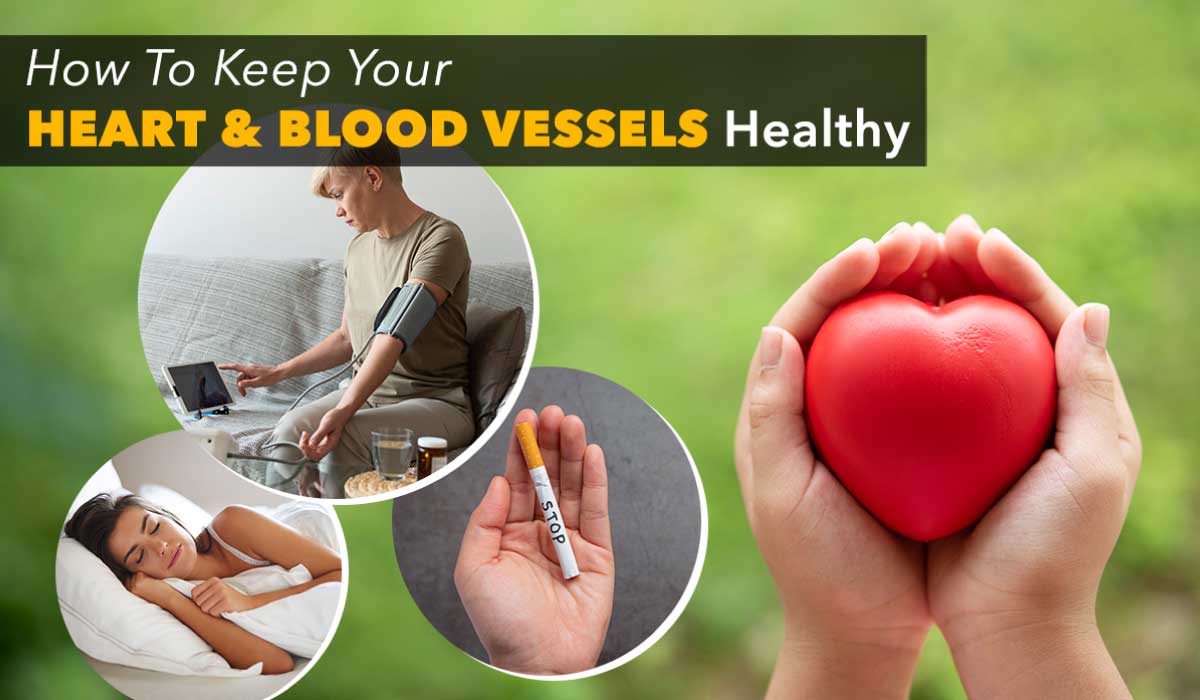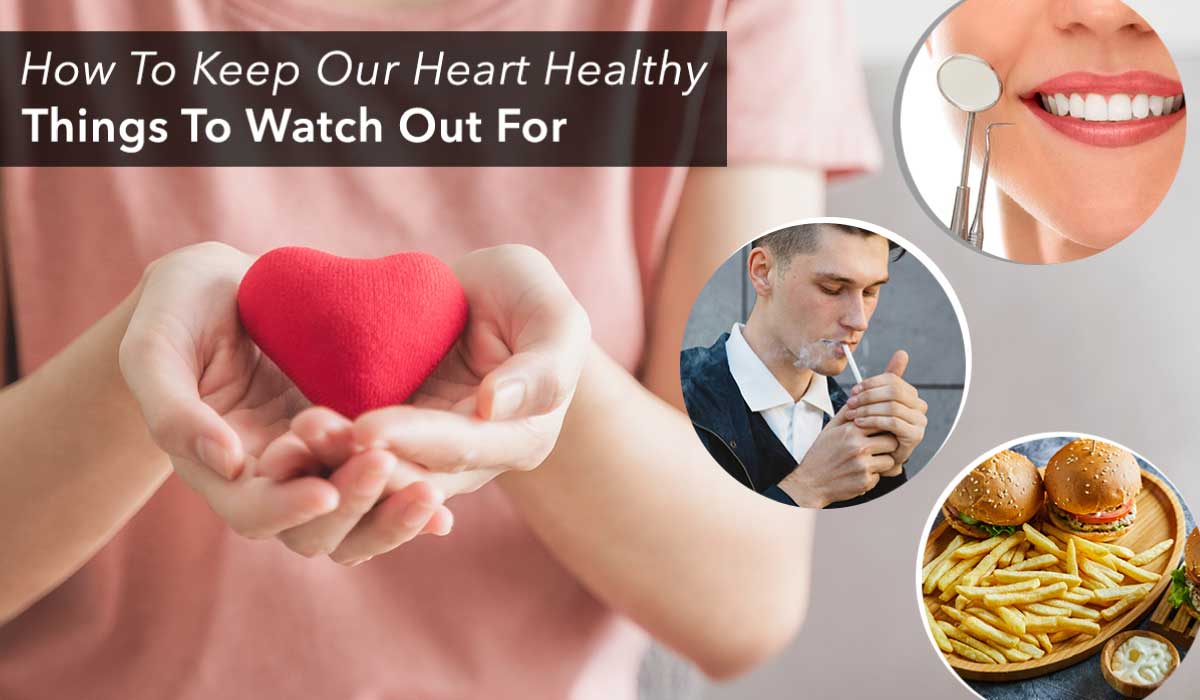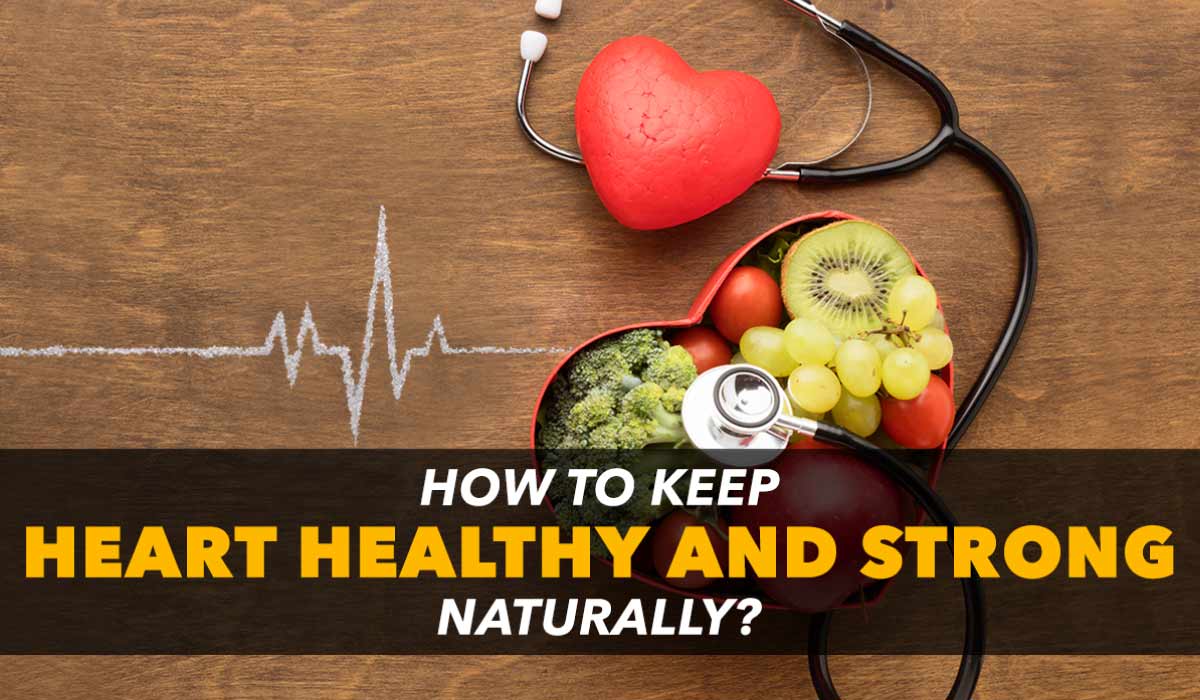Contents
Introduction
Keeping your heart healthy is not an easy job at any age. Our lives have become busy and stressful, and our lifestyles often take a toll on our health. However, there are some things that we can follow which can help your heart stay healthy. We are here to help you, and talk to you about how to keep your heart healthy.
There are some things which you should know if you want to keep your heart healthy. The type of food you eat, habits you should avoid, things you should do and regular health checkups that you should follow can have a profound effect on your heart’s health.
Among other things, we will also discuss the effects of smoking and second-hand smoking, how bad high blood pressure can be and ways to keep it in control, why it is important to schedule your sleeping hours and how active you must be in a day. (Source)

How to keep your heart and blood vessels healthy
In our life we have to make some minor changes to keep our heart healthy. Some people get their problems through genetics and some through their lifestyle. Nevertheless, everyone should take care of their hearts.
Here are some tips you can keep in mind:
1) How to keep your heart healthy naturally- by sleeping right
A good night’s sleep is an essential factor for a healthy heart. Cardiovascular and coronary heart diseases are common in people who are deprived of sleep. While you sleep, your body rests and heals. Lack of sleep may also aggravate stress and anxiety- which in turn may lead to heart problems.
As insignificant as it may look- snoring is an important factor where. Two out of ten adults have sleep apnea, a condition that causes pauses in breathing during sleep. If not properly treated, sleep apnea can contribute to high blood pressure, heart disease and stroke. Rest is something that you should never bargain with. (Source)
2)Check your blood pressure regularly
High blood pressure plays a vital role in damaging your heart. Consuming alcohol has been the reason for 16% of high blood pressure cases. 27% of the people get high blood pressure through their genetics.
You must eat potassium-rich food to keep it in check. Bananas, oranges, cooked spinach, cooked broccoli, potatoes, sweet potatoes, mushrooms, peas, and cucumbers. (Source)
3)How to keep your heart and lungs healthy- by avoiding smoking
You must know that smoking is bad for your lungs and can cause breathing problems. But smoking also kills your heart, and causes more damage than what meets the eye. The amount of oxygen reaching the heart is reduced by nicotine.
The chemical from the smoke harms the blood vessels and creates more blood clots. Quitting smoking is very hard, but once done, you sure will have a healthy heart. (Source)
4)How to keep your heart healthy and strong- with regular exercise
Not being able to do any physical activity leads to an unhealthy heart. Activity is required for a healthy heart no matter who you are—walking and talking while on a call. Going to have a short walk in the park or even a run can help the heart by burning bad fats.
How exercise helps to keep the heart healthy has been scientifically proven. Working less and avoiding screen time makes a lot of difference. By exercising, you also ensure that your blood sugar stays in check, and an active lifestyle also prevents you from gaining weight. If you cannot keep your weight in check, you can develop diabetes- and that in turn can give rise to complications that affect the heart. (Source)
5)Junk Food – a bane for your heart
Avoid junk food. As much as it looks tempting, it can lead to a heart problem. Eating healthy foods can keep your heart running for years to come. For example, fruits, vegetables, oily fish, nuts & seeds, and garlic are the most recommended food for heart patients.
You can take note of all the above points- but you have to be extra careful as you age. To prevent heart diseases, you should know how to take care of your heart for advancing stages of your life.

How to keep your heart healthy as you age
The aging process is unstoppable but it doesn’t mean we can’t keep our heart healthy. Here are some suggestions to keep your heart healthy as you age.
How to keep your heart healthy in 20 years to 30 years
The early twenties are the period when you should start with routine health care checkups. Getting you a doctor for regular checkups is essential. Some tests like blood pressure, cholesterol level, body mass index, blood sugar, and heart rate should be taken monthly. Pregnant, diabetic, and overweight people must have a test on a weekly to monthly basis. (Source)
How to keep your heart valves healthy in 30 years to 40 years
The thirties is the age when you set a family, career, home, child, and future planning. So little time to worry about your heart. You have to build a healthy life and a healthy family. Take your kids to a regular walk in the park or even cycling. Spend more active time and less timing lazing around the house.
Cut that screen time and go for a morning and evening walk or a jog. Making it a habit and teaching it to your coming generation will benefit your children and your children. You must also keep the stress level in check; high stress can cause high blood pressure and increase your heart disease risk.
At this age, you should start investigating your family history with a medical problem. This won’t just help you keep your heart healthy but also act as an early warning system. Having a family member with heart disease increases your chances of having one too.
After knowing your family tree, the physician can set an exercise, diet routine that you must follow. (Source)
How to keep our heart healthy and strong in 40 years to 50 years
The forties are a bit tricky. You need to take care of a lot of things. As the metabolism slows down, you have to have a heart healthy diet. Getting exercise is a must. You can have a dog to walk and jog with. Get yourself a friend who exercises with you, your exercise buddy.
Getting your cholesterol levels, blood sugar levels checked up and other heart-healthy screening every month is a must. These tests help you in the future and should be taken at an early age if you have diabetes or are overweight. (Source)
How to keep heart valves healthy in 50 years to 60 years
The fifties are when you age to become an old and wise person, and so should your habits. You start taking extra care of those wrinkles and grey hair, but what about your heart?
Having a balanced meal is key to a fair and healthy heart. Your diet should include foods rich in good cholesterol and healthy fats. Your intake of fruits and vegetables should be high, grains, pulses, fibre-rich food products, nuts, fish oils twice a week. Don’t forget to always be hydrated.
Men and women who are diagnosed with either high cholesterol, diabetes, high blood pressure or other conditions have a higher chance of getting a heart attack. You must always be prepared in case of a heart attack. Learn the symptoms of a heart attack and how it is different in men and women.
The risk of heart attacks can also be lowered by following diet plans, prescribed medication and treatment by the doctor, changing your lifestyle and getting more active. (Source)
How to keep heart healthy in 60 years and above
The sixties and coming years are the toughest of them all. With this age, heart risk is imminent- your blood pressure and cholesterol levels may rise and other heart-related health problems may start. To live a longer and a better life, you must stick to healthy eating habits and exercise.
The monthly test you take must have an ankle-brachial index test. The test lets you diagnose any peripheral artery disease (PAD); in this disease, the plaque builds up in the leg arteries. This disease is not known by many but can have adverse effects on your life.
As we grow older, the body requires less energy to work. So more food intake means more fat. The more the fat, the harder it gets for your heart to work. In turn, this increases the risk for heart disease, high blood pressure, diabetes and high cholesterol. Eating less and regular exercise will keep you healthy.
If you know when you are getting a heart attack or a stroke, you can respond to it quickly and get help. Treating it as soon as possible will save your life and protect you from serious injuries. For this to happen, one must learn the symptoms of heart attack and strokes. (Source)
We have discussed diet and exercise to keep your heart healthy, but there are few ways a human must be cautious in their day to day life. If you know them, you will be at the peak of your health no matter your age.

How to keep our heart healthy things to watch out for
Here are a few things you should pay attention to:
Trans fats
Know the difference between healthy fats and trans fats. The human body requires three different types of fats in their diet-Saturated, Unsaturated and Polysaturated fats. You don’t need trans-fats as they are known to increase your risk for heart attack and multiple heart disease. Trans fats increase the bad cholesterol (LDL) and decrease your good cholesterol levels (HDL).
By getting rid of trans fats in your diet, you have a good blood flow in your body. How can you identify trans-fat? It is an industry-created fat. Mostly found in packaged baked goods, snack foods, margarine and fried fast foods to add flavour and texture. Look at the labels of these food products under hydrogenated oils. Try to eat food with 0% Trans fats or altogether avoid it.
Dental hygiene -h3
Dental hygiene is a must, especially flossing the teeth. Because people having gum diseases end up having heart disease. Scientists have found that bacteria in the mouth help develop gum-related disease. These can move in your bloodstream and cause an escalation in C-reactive protein, a significant cause for inflammation in the blood vessels.
These changes may result in giving you heart disease or even a heart attack. Taking care of your teeth does not mean just worrying about the cavities. It is a lot more than that. A healthy gum is equal to a healthy heart. (Source)
Sleeping -h3
One study looking at 3,000 adults over the age of 45 found that those who slept fewer than six hours per night were about twice as likely to have a stroke or heart attack as people who slept six to eight hours per night.
Sleeping too little causes interference in fundamental biological processes and health conditions, which causes high blood pressure and inflammation in the human body. So sleeping for up to 10 hours is a must no matter your age. For those who have sleep apnea, you should get it treated as it results in heart disease and arrhythmias. (Source)
Sitting
Sitting won’t benefit you at all, don’t sit for too long as a study shows that sitting for too long is very bad for your health and no matter how much exercise or activities you do. This is troublesome for those who sit at a desk-bound job all day. A combined study of nearly 800,000 people shows that those who sat for a more extended period had a 147% chance of having cardiovascular disease and a 90% chance of dying due to it.
You can develop deep vein thrombosis (a blood clot) for sitting elongated for long periods of time. Remember to do your exercises daily, walk your children to school, park your vehicle far from the office, stand and work sometimes.
Smoking kills -h3
Smoking is terrible, but do you know what is worse? Second-hand smoking. You have 25% to 30% higher chances of developing heart diseases. According to the American Heart Association, exposure to tobacco smoke contributes to about 34,000 premature heart disease deaths and 7,300 lung cancer deaths each year.
Those who have high blood pressure and high blood cholesterol have a significant risk of developing heart disease when exposed to second-hand smoke. This the result of the plague build up in the arteries by the chemicals emitted from the cigarette smoke.
No one is going to stop the smokers around you. So you have to be firm and avoid them and tell them also to keep a distance. Keep your young once away from second-hand smoke. (Source)

Children’s heart and their needs
As we are coming to the end of the topic, doctors give a few tips to keep your child’s heart-healthy.
Go out with your kids to play some games with them, enroll them into swimming classes. Workout as a family. Do fun activities with the children; take them to a healthy picnic. Celebrate every family member’s success to keep positivity high.
Limit the screen time to at least 2 hours a day. More screen time means more laziness, increasing the chances of having cardiovascular disease or obesity in the child.
Visit a child pediatrician from time to time for a psychical evaluation. Go shopping with your children; teach them to read the nutrition labels. Add 100% whole wheat products in their diet.
Invite your child in cooking and planning for the meals. Keep them away from processed food and especially salt shakers.
Join the PTA and advocate for your child and others to have a healthy school meal. Keep his/her BMI, blood pressure and cholesterol in check. Taking these small steps will help you achieve your goals and make a massive difference in your child’s health over time. (Source)
Conclusion
If you have a genetic tendency towards hypertension, diabetes or heart diseases- you need to be extra careful about keeping your heart healthy. However, if you maintain a healthy diet, exercise regularly and go for regular health screenings- you can lead an enriching life. Talk to your doctor about how you can keep your heart healthy and happy!
FAQs
What are the signs of a healthy heart and how to keep heart healthy and fit?
A healthy heart depends on many factors. The heart rate, blood pressure, energy level, cholesterol level, quick recovery rate, good oral health and healthy breathing are some of the factors it depends on. A heart-healthy diet consists of foods with low saturated fat, sodium or salt, and added sugars. If you are looking for heart-healthy items, look for high-fiber foods such as vegetables, whole grains, and fruits. If you want certain fats, look for the fats in olive oil and fish.u003cbru003e
Are eggs one of how to keep heart healthy foods?
Doctors recommend seven eggs in a week for a healthy heart. Studies show that eating seven eggs a week can protect you from certain types of heart stroke and macular degeneration, a serious eye condition which may lead to blindness. Another study by the American Journal of Clinical Nutrition states that consuming 12 eggs a week for three months didn’t increase cardiovascular risk factors for people with prediabetes oru003ca href=u0022https://www.vitsupp.com/diabetes/u0022u003e type 2 diabetesu003c/au003e. This study also stated that having the same u003ca href=u0022https://www.vitsupp.com/high-protein-foods-list/u0022u003ehealthy diet helped to lose weightu003c/au003e.
What are the 4 signs your heart is quietly failing?
In the movies, we mostly see a person clutching his or her heart before getting a heart attack. The real heart attack differs from reel heart attack. You will come across a lot of signs our heart gives before failing. The following are some of the big signs anyone can catch are fatigue and weakness, increased need to urinate at night, very rapid weight gain from fluid retention, lack of appetite and nausea. You should learn more about how to keep heart healthy after heart attack.
What diet do most cardiologists recommend?
Doctors say we should eat minimal red meat, maximize the intake of fresh fruits and vegetables, and cook our food in olive oil. Eat more nuts which contain good fats, drink a glass of wine or two with the food. Bake the food like chicken or air fry it, stick to deep-sea fish such as salmon and tuna. (Source)


